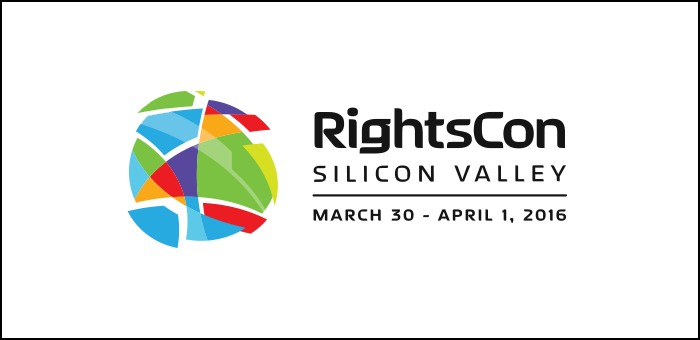WITNESS at RightsCon, Silicon Valley
Next week RightsCon Silicon Valley is taking place in San Francisco- an annual conference that brings together distinguished thought leaders, activists, and technologists for discussion around the internet and human rights.
WITNESS will again be participating in the three-day convening, and ensuring that issues surrounding video are included in broader dialogue concerning how today’s digital systems impact human rights defenders. Part of our involvement will be contributing to panel discussions and presentations. The full schedule can be found here and descriptions of WITNESS’ participation is below:
The Promise Video: Documenters, Technology & Accountability
Wednesday March 30th, 12:00pm – 1:15pm
Panel: Yvette Alberdingk Thijm (WITNESS, Executive Director), Alexa Koenig, Christoph Koettl, Linda Walter
Description: Thanks to the global proliferation of inexpensive mobile devices, video captured by citizens and on-the-ground human rights activists can be instrumental in drawing attention to human rights violations. But many of these frontline documenters want their videos to do more. They have the underlying expectation that footage exposing abuse can advance investigations of human rights and international crimes and bring about justice and accountability. And it can.In many situations, these citizens and activists are better positioned to collect evidence of human rights abuse than professional investigators because investigators almost always arrive after-the-fact when evidence has deteriorated or is gone. However, the quality of citizen video and other content rarely passes the higher bar needed to function as evidence in a court of law.
This panel brings experts together to examine the importance of the game-changing role that frontline documenters are playing in transforming the fields of justice and accountability as well as the concrete steps they can implement to capture, organize, and manage the rich information they collect via video cameras in the field. In turn, this will ensure investigators and lawyers have better evidence to successfully hold those most responsible for crimes, systemic discrimination, and mass atrocities accountable.
—
The Visual Communication Explosion Online: Where do Human Rights and Human Rights Users Fit?
Thursday, March 31st, 10:30am – 11:45am
Panel: Sam Gregory (WITNESS, Program Director), Amanda Conway, Munya Dodo,Mona Kareem, Julie Nelson
Description: YouTube, Facebook and Twitter native video, Snapchat, Periscope and Meerkat…. More and more online and digital tools are becoming photo and video centric. This past year we saw the rise of ephemeral photo and video, live video, and the beginnings of VR. These are increasingly being used by both the ordinary citizen as a tool for free expression and the human rights defender from Ferguson to Rio to the conflict areas of Syria, as well as by perpetrators from ISIS to far-right extremists. How do we consider the particular human rights usages, human rights challenges and human rights value implications of visual media tools ranging from Snapchat, Facebook, Periscope to YouTube?
What are the particular censorship, surveillance and free speech concerns around video and photo tools and products? What are new approaches to how contentious visual content be best handled? How should live video content be handled? What are the particular anonymity concerns around visual media and how should issues of visual anonymity be handled? What does anonymity look like in a video-mediated world, and how can privacy by design and user-centric options help enhance this? Where does facial recognition fit in this map? When these visual technologies intersect with potentially ubiquitous wearables and enhanced sensors what are the rights implications and the human rights usages and pitfalls? What are the pros and cons from a human rights perspective of metadata-rich images and video? What are the human rights and consent implications of live video, and wearable-mediated live video?
We’ll have a focused, candid conversation on how we handle these issues.
—
Witnessing Police Violence On and Off the Internet
Thursday, March 31st, 12:00-1:00pm
Panel: Morgan Hargrave (WITNESS, Systems Change Coordinator), Malkia Cyril, Taina Vargas
Description: In case after case, video footage is exposing police abuse to wider audiences but not always delivering justice, and questions about the effectiveness and ethics of those images and the ways in which we share them are only gaining importance. This panel will look at the tools+platforms that people use to document police violence, the ways in which witnesses and police are sharing footage, and how we can better make an impact. Participants will discuss the ways tech and media can overcome obstacles to justice, how to protect the rights of those on both sides of the lens, and the coming challenges for online organizing towards police accountability in the US and abroad. Beyond eyewitness media, we will also address the privacy, access, technology, and accountability issues tied to the most prevalent policy response to date: bodyworn cameras.—
Mobil-Eyes Us: Using Live Video and the Power of Networks for Smart Activism
Thursday, March 31st 4:00-5:00pm
Lightening Talk Speaker: Sam Gregory (WITNESS, Program Director)
Description: ‘Mobil-Eyes Us’ uses the power of live mobile video to connect you to direct experience of causes you care about, and then use disruptive tools from the collaboration economy to provide you meaningful ways you can act by doing what you do best. We know that millions of people globally take actions for issues they care about – but frequently their only option is a click to donate or sign a petition. Often they don’t feel connected to the issues or the actions and usually the available actions are also not a good use of their skills, leverage or capacity. What if we could create a ‘witnessing’ corps of people ready to tune in live? What if, using live video, we could bring supporters into a human rights or other social justice situation at the right time to fully experience the reality? And then ask them to use their unique skills, leverage, or networks to take action – for example to deter illegal violence by their group presence, to rapidly share a stream or invite others to act as well, or to provide direct legal guidance? Through an effective integration of technologies with storytelling and movement-building, we are building out prototypes and doing pilots to help people feel more experientially connected to causes they care about and then take actions that matter. Join us!

